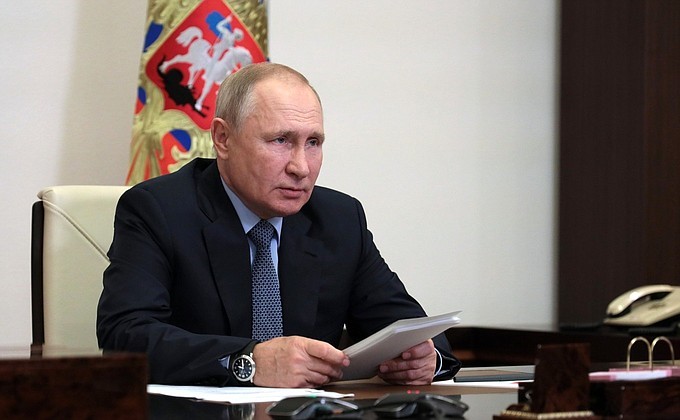President Vladimir Putin is running low on soldiers to conduct his war in Ukraine. Despite adding soldiers once assigned to the Arctic, others recruited from the country’s prisons, and older civilians from among the general population, there is an overall lack of willingness to replace frontline soldiers. Reports coming in from various Western media organizations say that new are not receiving the minimal amount of training normally required to conduct military operations. Training videos snuck out of Russia depict women teaching soldiers how to use feminine products as bandages. Others show soldiers training without guns, equipment, or meals. Russian soldiers are left to fend for their own food while on the battlefield. The dearth of money and human capital has forced Putin to move his effort to dragoon more men into service from Russia to the countries in Central Asia.
In November, the Russian president signed a decree allowing foreign citizens to serve in the Russian Army as contractors and conscripts. It was depicted as an opportunity for Central Asian citizens residing in Russia. Nurbek Bekmurzaev, of the Jamestown Foundation, notes that the Russian publication Vzglyad is reporting that the Deputy Chairman of the Russian State Duma Defense Committee Andrey Krasov expressed his firm belief that “a comparable number [of Central Asians] will want to come to Russia to serve—with an eye on the potential acquisition of Russian citizenship and career advancement.” It has, he adds, stirred discussions about the extent of the conscription of those from former Soviet satellite states, with many Russians concluding that it is a sign that the Kremlin is desperate to locate new soldiers.
As early as last February, at the start of the war in Ukraine, videos emerged of Kyrgyzstani, Tajikistani and Uzbek men driving Russian military vehicles. By March videos emerged of Central Asians dying and being buried in Ukraine. In September, Bekmurzaev says the first evidence of Uzbekistani citizens fighting in the war appeared on the internet, when a Ukrainian journalist released a video of two young Uzbekistani men in military captivity. The motivation for these young recruits is the result of Russian trickery and coercion. In some cases, they are threatened with the stripping of potential citizenship if they refuse to join the Russian armed forces and fight.
According to CabarAsia, several human rights defenders who work with labor migrants have reported hundreds of cases in which Central Asians with Russian passports received summons to arrive at military enlistment centers or risk being stripped of their citizenship. Putin’s policy goes further. “For those without Russian passports, the authorities in Moscow have legalized organizational arrangements conducive to recruitment. On September 20, Moscow Mayor Sergei Sobyanin announced the launch of a recruitment center at the Sakharovo Migration Center, where virtually all labor migrants have to visit to undergo mandatory fingerprint scanning and physical examinations, as well as receive work permits,” according to Bekmurzaev. The Duma recently simplified the pathway to citizenship by reducing the five-year wait to one in exchange for military service.
Despite all of Putin’s recruiting attempts, the Russian Armed Forces continue to fall short of recruiting goals this January. Central Asians are not stronger patriotic toward Moscow. Their citizenship, notes Bekmurzaev, is only a means to better cope with the discrimination and bureaucracy they face daily in Russia. The colossal losses on the Russian battlefield continue to suppress the number of able-bodied men willing to go fight in Ukraine. Add to this, that Kyrgyzstan, Tajikistan and Uzbekistan have issued stern warnings to their citizens not to fight in Ukraine. The potential soldiers now face lengthy prison sentences for participating in armed conflicts abroad as mercenaries. Most Central Asian migrants plan to return home after their time in Russia and do not want to risk ending up with a long prison sentence upon their return.
This leaves Putin needing to locate addition manpower on the frontline to compensate for growing losses as the war approaches the one-year mark. News of the deaths of foreign recruits is suppressed by the Russian media in an attempt to fill the ranks with those faraway people who will go largely unnoticed from Russian cities if killed in the war. Bekmurzaev points out that the mass participation of Central Asian migrants in the war spells a whole new set of troubles for the region and not just Putin. “Besides a significant decrease in remittances, which comprise one-third of the GDPs of Tajikistan and Kyrgyzstan, the region faces a threat of welcoming back numerous war veterans, which could lead to a subsequent increase in alcohol and drug abuse, suicide, domestic violence and crime.” Returning compatriots are now trying to discourage migrants from fighting in Ukraine are in direct competition with the Russian government. Despite things not going well for Putin he is not backing down and there is no end in sight to the war in Ukraine.
Daria Novak served in the U.S. State Dept.
Illustration: Pixabay
